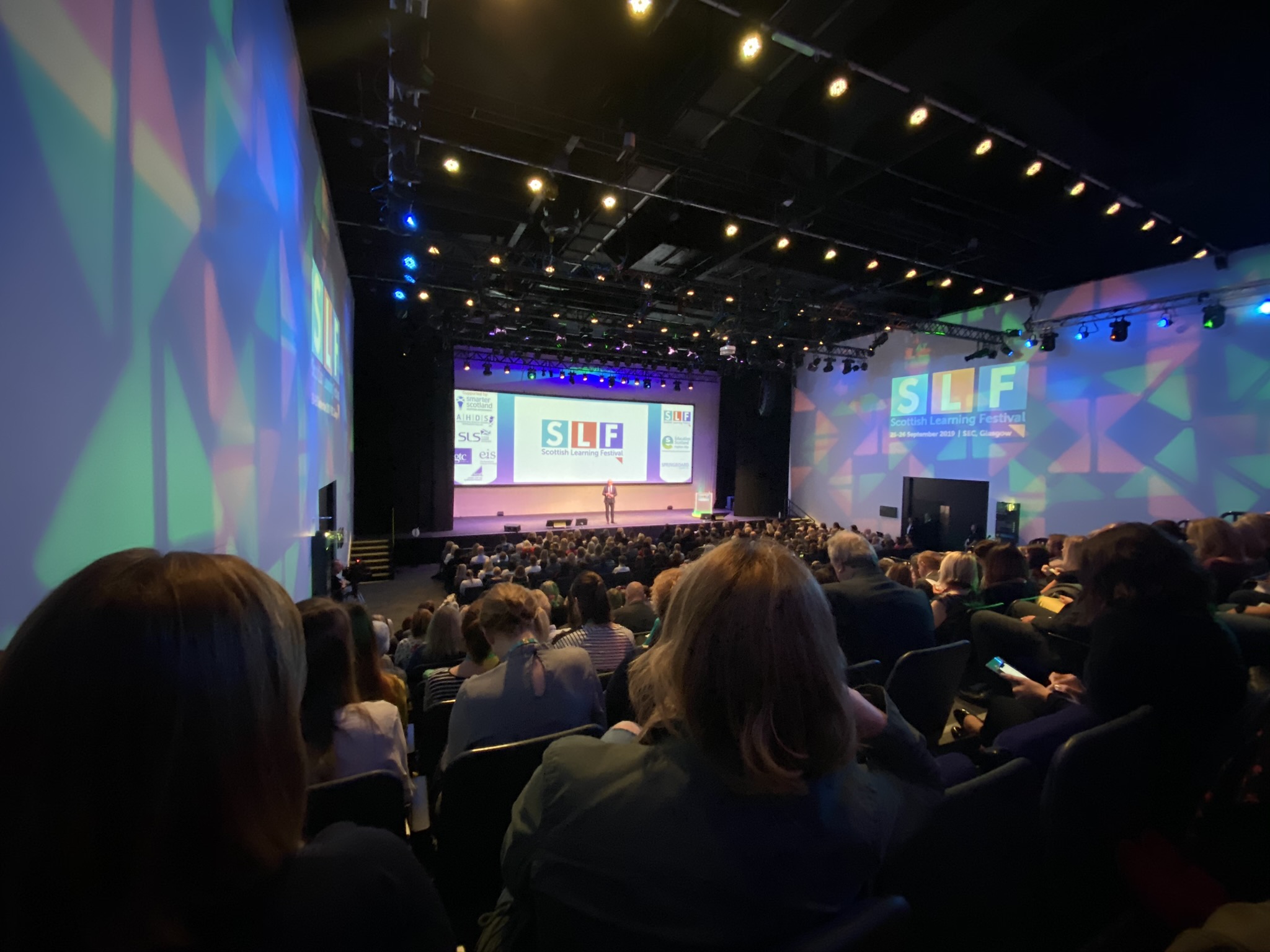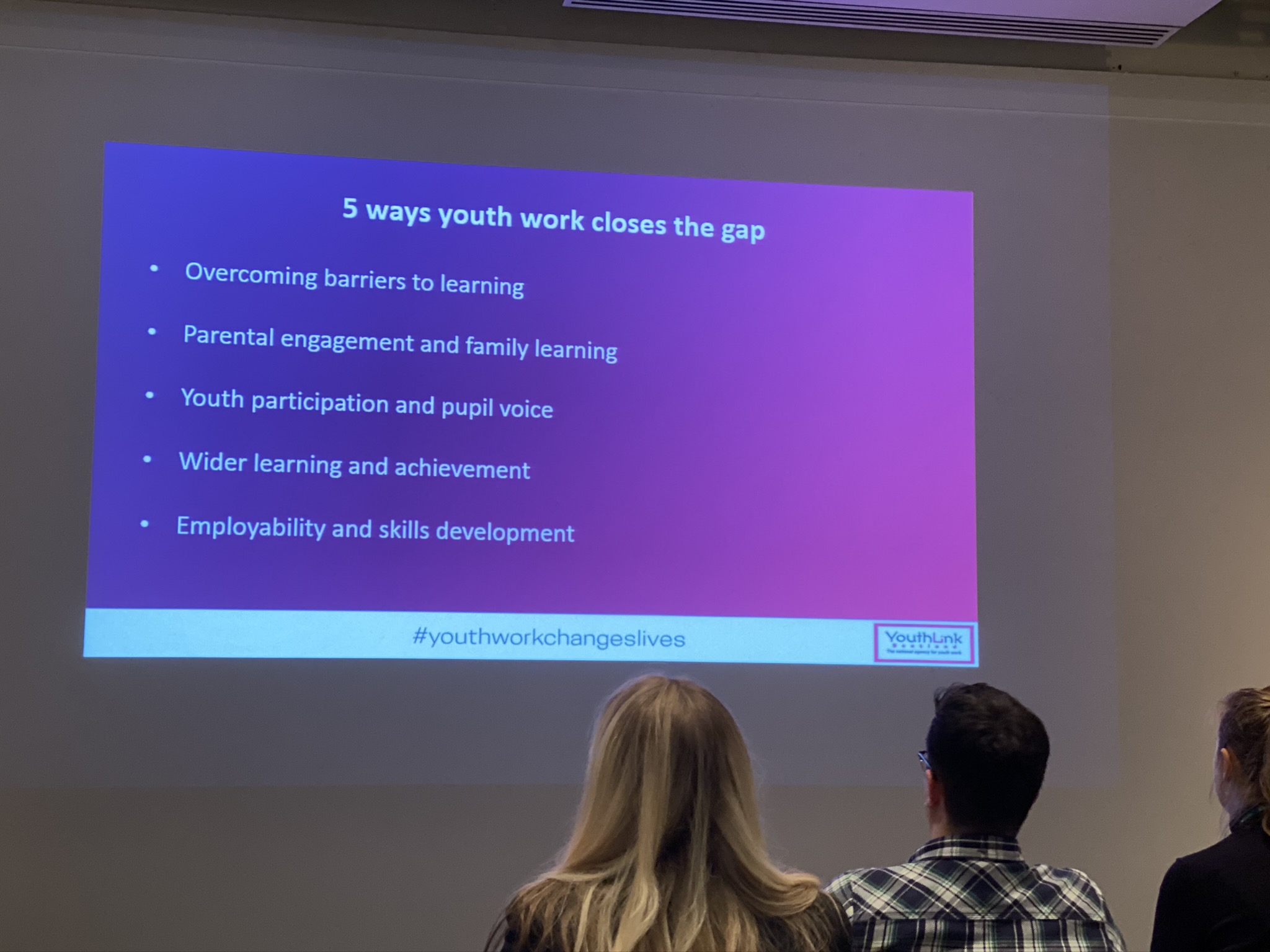by Scott Faulds

At this year’s Scottish Learning Festival, there was a large selection of seminars offered which allowed delegates to gain knowledge of good practice from across the Scottish education sector. One seminar of particular interest was run by YouthLink Scotland, the national agency for youth work, who discussed their youth work and skills partnership programme, which is designed to help close the attainment gap. This programme is funded by the Scottish Government via the Scottish Attainment Challenge and Pupil Equity Funding.
Collaboration
YouthLink Scotland believe that the key to tackling the attainment gap is through strengthening the collaboration between the youth work sector and formal education, via a focus on reducing the impact of poverty on attainment. A key element of fostering this collaboration is through a development of mutual trust and respect. Understanding and respecting different pedagogy, roles and approaches enables youth workers and educators to work together to help young people overcome barriers to learning.
Establishing relationships
It is important to recognise that teachers and youth workers establish different types of relationships with young people. For example, youth workers have a dedicated focus on young people, specialise in personal, social and educational development and are inclusive without being based on a singular interest, skill or capacity. The different relationship developed by youth workers can be useful when interacting with young people who are almost at the point of refusing school and may not feel comfortable speaking to their teachers. The effects of youth work interventions can be profound, with YouthLink Scotland finding that successful interventions have led to improvements in attendance, engagement, attainment, health and wellbeing and school leaver destinations.
Youth workers are able to complement and enhance the formal curriculum by delivering tailored interventions, planned in partnership with teachers, that will help to provide a variety of alternative learning options to vulnerable young people. These interventions can help reintegrate students to the classroom setting and provide them with opportunities to gain youth work awards that recognise wider achievements. Additionally, youth workers are able to contribute to school improvement planning, self-evaluation and help measure the impact of youth work interventions. The involvement of youth workers in these processes allows for the development of evidence of what works and can be used to increase understanding of youth work and how it can support the formal education sector.

Good practice: The Hub, St Stephen’s High, Port Glasgow
An example of a successful collaboration between youth work and the formal education sector is the development of The Hub at St Stephen’s High, Port Glasgow, where 80% of pupils are within the first to third deciles of the Scottish Index of Multiple Deprivation.
The Hub is a nurturing environment that pupils can be referred to by principal teachers of Guidance and other members of the senior management team. It is important to note that The Hub should not be considered an internal exclusion base, rather, it is a space that facilitates short term interventions with a focus on the pupil returning to the classroom environment. The main focus of The Hub is to improve the attainment of disengaged groups of pupils, with intervention from teachers, classroom assistants, youth workers and other third sector organisations such as Barnardo’s.
The Hub offers a streamlined approach to providing support to disengaged pupils, with the level and type of support tailored to the needs of each pupil. This can include operating activities outside of the formal school setting, and the collaboration with youth workers ensures that activities can also be operated outside normal school hours. A representative from St Stephen’s High, spoke highly of The Hub arguing that the ability for disengaged pupils to develop support systems with youth workers was key to their successful reintegration into classroom-based education.
Additionally, the Hub provides services to both the wider school and local community, such as a breakfast club and food bank. The Hub also encourages and develops parental engagement through events such as “parent and carers wellbeing day” and “twilight teas”. These events are becoming increasingly more important to youth workers, as research has shown a link between parental engagement and the attainment gap, especially around periods of transition.
Final thoughts
Tackling Scotland’s poverty-related attainment gap is a long-term challenge that will involve collaboration from groups across the country. The collaboration between youth work and the formal education sector allows for the exchange of pedagogy and approaches that will ultimately allow for the development of better interventions to help vulnerable young people.
It is important to recognise that some young people may not feel comfortable talking to a teacher and therefore the availability of youth workers may allow them to develop alternative relationships which can help them re-join classroom education. Re-engaging young people who are close to refusing school is vital in eradicating the poverty-related attainment gap. All actions to prevent this must be explored.
If you enjoyed this article, take a look at our previous blog on the Scottish Learning Festival, which reflects on Deputy First Minister John Swinney’s keynote.
We have also blogged on a range of topics around education, including on Child and Adolescent Mental Health Services in schools. You can read more here.
Follow us on Twitter to see which subjects are interesting our research team.
Share
Related Posts
A recent item on BBC Radio 4’s Today programme generated an unusually high number of responses from listeners. A man who had lost his job in the financial services sector at the age of 57 described his difficulty in trying ....
By Donna Gardiner While free school meals (FSM) have been available in England on a means-tested basis since 1944, recent years have seen a renewed focus upon the potential benefits of providing free school meals to all school-aged children. Currently, ....
By Robert Kelk and Chris Drake A new start for an old challenge? The recent appointment of Marc Lemaître as the European Commission’s director general for research and innovation (R&I) has returned Europe’s R&I gap to the spotlight. Previously head ....
By Hannah Brunton UNESCO’s Global Media and Information Literacy Week 2022 takes place from 24-31 October 2022 under the theme of “Nurturing Trust”, giving governments, educators, information professionals, and media professionals the chance to discuss and reflect on critical issues ....
